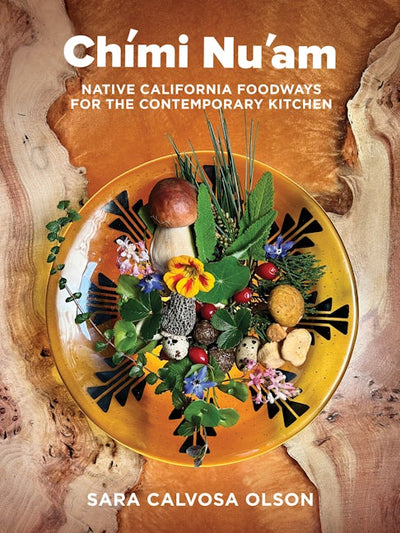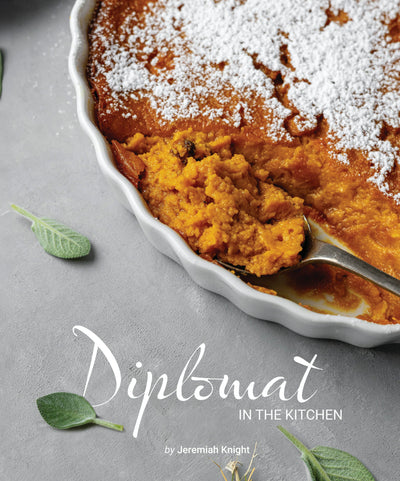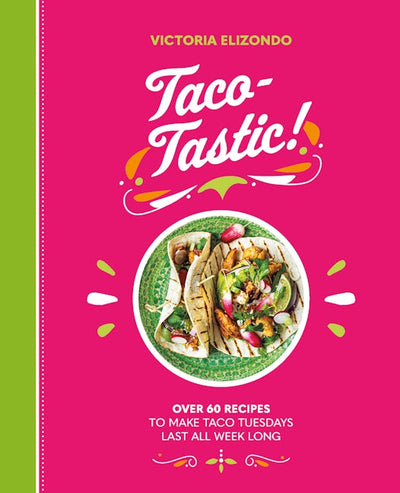You may also like
Chími Nu'am
Regular price $40.00 Save $-40.00More than seventy delectable recipes that bring California’s Indigenous cuisines into kitchens today.
Finalist for the 2023 Glenn Goldman Award for Cooking, Chosen by the California Booksellers Alliance
In this sumptuous cookbook, Sara Calvosa Olson (Karuk) reimagines some of the oldest foods in California for home cooks today. Meaning “Let’s eat!” in the Karuk language, Chími Nu’am shares the author’s delicious and inventive takes on Native food styles from across California. Over seventy seasonal recipes centered on a rich array of Indigenous ingredients follow the year from Fall (elk chili beans, acorn crepes) to Winter (wild boar pozole, huckleberry hand pies) to Spring (wildflower spring rolls, peppernut mole chicken) to Summer (blackberry braised smoked salmon, acorn milk freezer pops). Special sections offer guidance on acorn preparation, traditional uses of proteins, and mindful ingredient sourcing.
Calvosa Olson has spent many years connecting her family’s foodways with a growing community, and these recipes, techniques, and insights invite everyone to Calvosa Olson’s table. Designed as an accessible entry for people beginning their journey toward a decolonized diet, Chími Nu’am welcomes readers in with Calvosa Olson’s politically attuned and irresistibly funny writing. With more than 100 photographs, this cookbook is a culinary gift that will add warmth and mouthwatering aromas to any kitchen.

Diplomat In The Kitchen
Regular price $45.00 Save $-45.00With over 20 years of exploring the world’s diverse cuisines, Jeremiah Knight has learned from local chefs, street vendors, and home cooks, weaving together a rich tapestry of flavors that honor tradition while embracing innovation. Diplomat in the Kitchen is more than a cookbook—it’s a culinary journey that transports you across continents, celebrating both the authenticity of beloved dishes and the exciting fusions that give them new life.
Jeremiah is not just a food enthusiast; he’s a storyteller. Through every recipe, spice, and flavor, he brings to life the cultures, histories, and personal connections that make each dish unforgettable. Whether you’re a seasoned cook or an adventurous foodie, this book invites you to experience the world one plate at a time.

Forbidden
Regular price $30.00 Save $-30.00Winner of the 74th National Jewish Book Award: The Jane and Stuart Weitzman Family Award for Food Writing and Cookbooks
A surprising history of how the pig has influenced Jewish identity
Jews do not eat pig. This (not always true) observation has been made by both Jews and non-Jews for more than three thousand years and is rooted in biblical law. Though the Torah prohibits eating pig meat, it is not singled out more than other food prohibitions. Horses, rabbits, squirrels, and even vultures, while also not kosher, do not inspire the same level of revulsion for Jews as the pig. The pig has become an iconic symbol for people to signal their Jewishness, non-Jewishness, or rebellion from Judaism. There is nothing in the Bible that suggests Jews are meant to embrace this level of pig-phobia.
Starting with the Hebrew Bible, Jordan D. Rosenblum historicizes the emergence of the pig as a key symbol of Jewish identity, from the Roman persecution of ancient rabbis, to the Spanish Inquisition, when so-called Marranos (“Pigs”) converted to Catholicism, to Shakespeare’s writings, to modern memoirs of those leaving Orthodox Judaism. The pig appears in debates about Jewish emancipation in eighteenth-century England and in vaccine conspiracies; in World War II rallying cries, when many American Jewish soldiers were “eating ham for Uncle Sam;” in conversations about pig sandwiches reportedly consumed by Karl Marx; and in recent deliberations about the kosher status of Impossible Pork.
All told, there is a rich and varied story about the associations of Jews and pigs over time, both emerging from within Judaism and imposed on Jews by others. Expansive yet accessible, Forbidden offers a captivating look into Jewish history and identity through the lens of the pig.

The Hoosier Mama Book of Breakfast Bakes
Regular price $35.00 Save $-35.00The owner of the legendary Hoosier Mama Pie Company turns breakfast into an art form with this go-to guide for baking scones, muffins, and other morning favorites.
In the fifteen years since Paula Haney started Hoosier Mama Pie Company, it has become both a local favorite and national destination, widely regarded as one of the top pie shops in the country. But not everyone wants pie for breakfast, and after opening an Evanston location that opened at 6:30 a.m., Haney and her team began to dream up new sweet and savory bakes for the perfect morning.
With the same focus on local produce and fresh, seasonal ingredients that made her pies a Chicago institution, and the same warmth and easygoing style of The Hoosier Mama Book of Pie, Haney again invites home bakers into her kitchen—this time with a collection of budget-friendly recipes that largely go from idea to eating in under an hour. This book is meant to be kept on the kitchen counter with a dusting of flour between its pages. It’s a working manual with practical tips and techniques along with base recipes that can handle endless variations, encouraging readers to discover their own favorite combinations.
Whether it’s browned butter banana-Nutella quick bread, scones packed with maple and bacon or strawberries and basil, tender Danishes with cream cheese and fruit, or biscuit sandwiches with all the fixings, these delicious, approachable recipes will make everyday breakfast feel like a special occasion—all before the coffee’s even brewed.

Taco-tastic
Regular price $22.95 Sale price $18.36 Save $4.59Increase your Taco Tuesday repertoire and take a deeper dive into the versatility of this popular mealtime treat with this collection of fun, accessible taqueria food.
Specializing in vibrantly colorful, authentic Mexican fare using only fresh ingredients, chef Victoria Elizondo focuses on Mexican guisos - the type of food that makes you feel you are home. There are quick and easy recipes to rustle up on weekday nights, with vegan and veggie alternatives, a vast range of salsas and sides, as well as slow-cooking specialties enriched with aromatic spices. So, whether you are looking for family or after-work meals, planning a fiesta, or anywhere in between, here are creative inventions to stimulate your palate and enrich your dining experience.

Flavors of al-Andalus
Regular price $39.95 Save $-39.95"This is a fascinating book about history but not stuck in time. Janet is a time traveler, telling us stories about the past but always making them relevant, bringing the world of al-Andalus—a region very close to my heart—to our kitchens today."
--Chef José Andrés
This cookbook explores the deep and lasting influences that Islamic culture has left on modern Spanish cooking. Muslims first invaded the Iberian peninsula in 711 CE, crossing the narrow straits from North Africa and taking over most of what would become the country of Spain. The newly-conquered land initially under the caliphate of Damascus, was called al-Andalus and at one time covered almost the entire Iberian peninsula.
At his palace of Medina Azahar around 950 CE, the Caliph of Córdoba dined on refined dishes of almond cream, lamb cooked with spices, eggplant stuffed with meat and scented with cinnamon, and carrot salad with sprigs of mint. The kingdoms of al-Andalus lasted eight centuries, ending in 1492 with the fall of Granada. Islamic culture left a deep mark on the country that became Spain—on language, science, literature and most certainly on cuisine.
Author and Spanish cooking expert Janet Mendel tells the story of the Moorish influence on Spanish cooking through 120 recipes for modern-day dishes, from salads and vegetables to fish, poultry and meat to sweets and pastries, that trace their heritage to foods served in medieval times. During periods of convivencia, the different communities—Muslim, Sephardic-Jewish, and Mozárabe Christian—lived together in friendly cooperation, shopping at the same markets, trading commodities, and sharing each other’s holidays and festive foods. The interweaving of cultures embedded the foodways of al-Andalus deeply in Spanish life.
Dishes from this era include exotic spices such as saffron, the use of fruits and almonds with savory dishes, and honeyed sweets and pastries. The flavors of al-Andalus live on in modern Spanish cooking and are what makes Spain’s cuisine distinctive from the rest of Europe.
Sample recipes:
- White Gazpacho with Grapes (Ajo Blanco con Uvas)
- Fried Eggplant with Molasses (Berenjena Frita con Miel de Caña)
- Monkfish with Raisins and Pine Nuts (Rape al Mozarabe)
- Chicken in Almond Sauce (Pollo en Pepitoria)
- Beef Stew with Artichokes (Cordero con Alcachofas)
- Almond Cream Pudding (Sopa de Almendras)
- Crispy Olive Oil Cookies (Tortas de Aceite)







